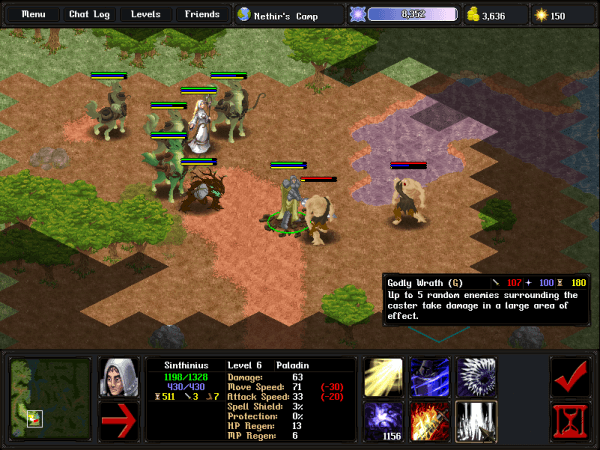
 Immortal Empire is one of those great games that appear out of nowhere. How does an indie game that mixes elements of Diablo, DOTA, and X-COM stay under the radar? Well, because it’s a browser game. Developer Jesse Attard managed to cram the entire thing into 15 megabytes or the equivalent of two average 320 kbps MP3s, and the game handily scored an 8/10 score here at Capsule Computers. Now, Jesse and Tactic Studio are looking to take the game to Steam after they were successfully Greenlit. They are looking to raise $8,000 CAD (Roughly $7000 USD) to make that possible. Jesse was kind enough to sit down for an interview to talk about Immortal Empire, video game development, and cat-ronauts.
Immortal Empire is one of those great games that appear out of nowhere. How does an indie game that mixes elements of Diablo, DOTA, and X-COM stay under the radar? Well, because it’s a browser game. Developer Jesse Attard managed to cram the entire thing into 15 megabytes or the equivalent of two average 320 kbps MP3s, and the game handily scored an 8/10 score here at Capsule Computers. Now, Jesse and Tactic Studio are looking to take the game to Steam after they were successfully Greenlit. They are looking to raise $8,000 CAD (Roughly $7000 USD) to make that possible. Jesse was kind enough to sit down for an interview to talk about Immortal Empire, video game development, and cat-ronauts.
Why did you choose to make Immortal Empire for the browser instead of making a downloadable game right off the bat?
We originally launched a beta for Immortal Empire in early 2010. Back then, being featured on a downloadable service like Steam was virtually impossible for a game like ours given that we have no publisher. Also, there weren’t too many high quality multiplayer browser games out there – Runescape was the big one. Evony was currently flooding the internet with advertisements featuring scantily clad women saying “Come play, my lord”. So we figured we were filling a much needed market gap by launching a high quality game with substance in a browser. I certainly think we were right! Shortly thereafter we saw an explosion of browser games. Of course, now it is much easier to be featured on Steam without a publisher (due to Steam Greenlight) so we finally have a chance to launch on that service.
Are there any specific challenges associated with rebuilding the existing game to a downloadable format versus starting a brand new game?
Yes certainly. You have your existing playerbase to consider. They like the game and want to keep their accounts, but may want to “upgrade” to the downloadable copy on Steam. So we need to create a system to transfer their accounts from whatever service they use (such as Kongregate) over to Steam. Furthermore, it means that serious changes to the payment model (like making it pay once instead of free to play) are out of the question. Not that we want to change the payment model anyways (because we want the game to be free) but still, it’s something to consider.
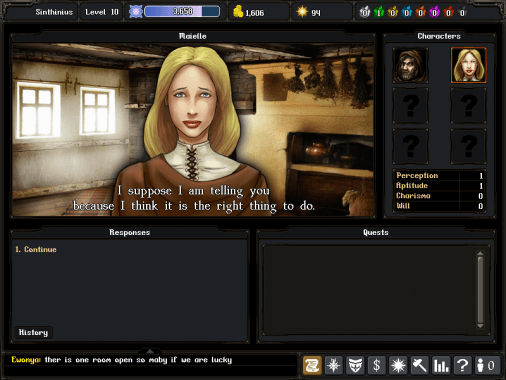
What’s in the cards for the future of the browser game?
The browser game will stay largely as-is in terms of visuals and audio. We can’t put voice actors in the browser game or increase resolution (we’ve had many complaints that 800×600 is too big!!). We can’t put in higher res artwork. Too performance intensive, too much memory consumption and the download size would be enormous. People complain pretty regularly about downloading 15mb worth of data to run the game. When it comes to the browser market, you have to design to the lowest common denominator, and that denominator is currently very, very low.
Still, the browser game will connect to the same servers as the Steam version, so there will be another influx of new players to play with. Furthermore, any gameplay additions we make (like the new character skins and weapon skins, or any of our stretch goal features) will show up in the browser version as well. So there will still be benefits for the people who want to stick with their browser.
The Immortals really go past the traditional human warrior in tons of shiny armour. Where do you find inspirations for all these units?
There’s a few good reasons for this. We didn’t have the resources to do both male and female versions of characters. There’s no “Priest” – just “Priestess”. So right off the bat we wanted to make some of the characters fairly gender neutral. In doing that, we created characters like the Treant. Even characters like the Dryad were kept fairly androgynous for a while and only assumed a specific gender when we had it voiced.
Of course, we wanted to have a few “regular” characters for those people who just really, really want to play as a Paladin or Mage. But otherwise, we actively tried to come up with more wild ideas like the Ivory Sentinel or Inquisitor.
In terms of inspiration – no question Dota was a huge influence here.
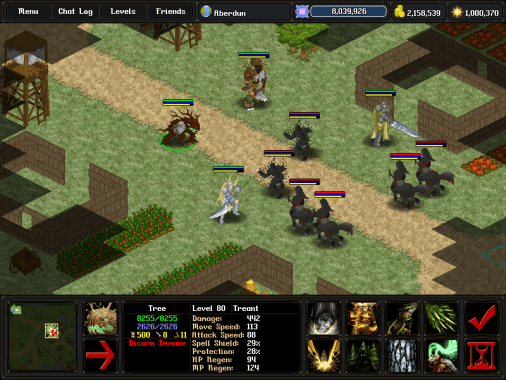
In your ideal fantasy world, who would voice your six dialogue characters?
Awesome question!
The Elder – Keith David (David Anderson from Mass Effect)
Maielle – Lena Headey
Dazo – Kevin Michael Richardson (Sarevok from Baldur’s Gate)
Quistan – Viggo Mortensen
Jalia – Jennifer Hale (Mazzy, Dynaheir – Baldur’s Gate, Femshep – Mass Effect)
Vuldreth – Ralph Fiennes
What are some of the challenges of balancing monetization with a free to play game?
This is a tremendously difficult thing to get right. Pay-once games are immeasurably simpler to produce from this perspective. In a multiplayer game like Immortal Empire, you want the game to be as free as possible so that you have a large community of players. This means that we don’t have any areas in the game locked or unreachable by non-paying users. Unfortunately, this also means that there is very little incentive to spend any money. And if people don’t spend money, we cannot possibly generate enough revenue to cover the cost of development, not to mention ongoing maintenance costs.
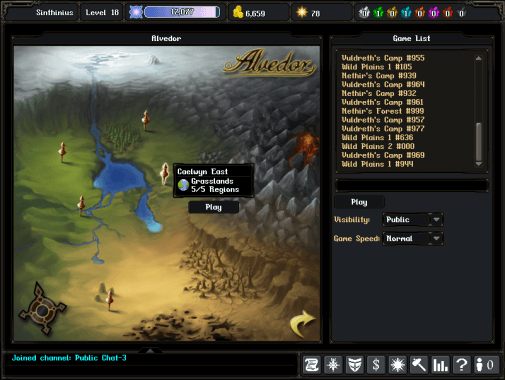
So you have to come up with things that players may want to actually buy. Of course, the things that drive sales are all things that actually have an in-game benefit. And as soon as you offer any sort of in-game benefit in exchange for real money, players get upset because they feel that people are just paying their way to success rather than proving themselves through skill. You shouldn’t be at the top of the leaderboards just because you’re wealthy – a sentiment I completely agree with.
Despite this, almost every free to play game gives some sort of advantage to paying players. Only a few very popular games can survive on cosmetic changes alone (like Dota 2 – though they have lots of other revenue sources). Basically what we try to do, and what most morally sound F2P games try to do is minimize that advantage. So in League of Legends, a paying player gets more options, which is an advantage. But, strictly speaking, it’s not as though their character directly does more damage. So the competitive advantage is, overall, fairly small. We do this in Immortal Empire as well – paying players get more options for their character choices.
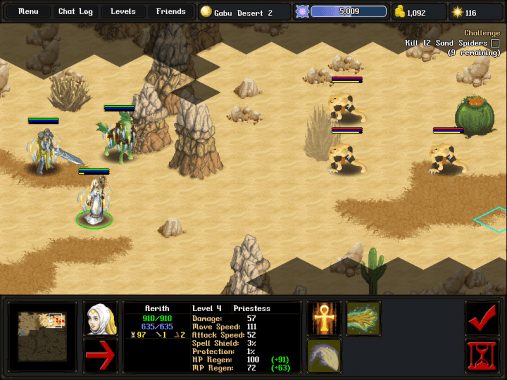
Another common theme is paying players can progress through the game quicker. Hearthstone does this – you can buy packs of cards which lets you build superior competitive decks much quicker. Or, you can go the “free” route and slowly grind away until you eventually amass all the cards. We also do this, but there is way, way less of a grind in Immortal Empire. I have been playing Hearthstone for months, free-only, just to see how many cards I can get without spending any money. I’ve played thousands of games, mostly arenas to maximize my gold & packs. I have most cards, and can build competitive decks now, but I’m still missing a bunch of rares, epics, and legendaries.
The progression in Immortal Empire is much more natural. You won’t be grinding. If you play through the game at a normal pace, you will have plenty of in-game currency to unlock whatever you want. Put another way – paying money is for people who want to rip through quickly, free play will get you there at a normal pace.
We’ve also made a number of design decisions to minimize the advantage for a paying player. Generally speaking, the benefits you get from paying are small in comparison to the benefits you get from playing. Your character level, the strategies you choose, how you equip your character and how you choose to level up, all of these things are far more important. And you cannot buy any specific items. It’s not like you can just add +10 damage to an item by paying $10 or something. You can buy a pack of items with random properties, but a free player could just as easily kill a few monsters and randomly find the best gear in the game.
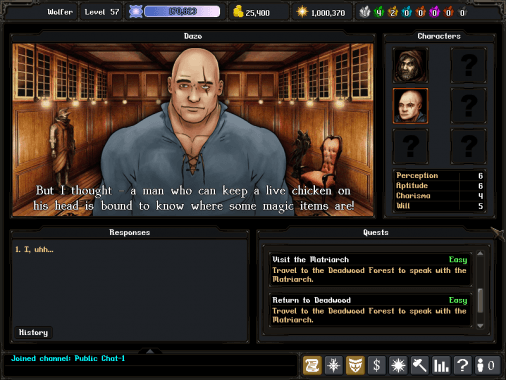
There’s even more to say here! In Immortal Empire there is nothing that *requires* real money. (Except the cosmetic-only kickstarter exclusive things we have going in our campaign right now!) There are quite a few games where real money is required to unlock everything. Even games you wouldn’t think have this system! Take Dark Souls 2 for example. No one would accuse this game of being “pay to win” (and they shouldn’t – it is a fantastic game and the DLC is well worth it). But it features PvP prominently, and there are items that are clearly superior that you can only acquire by buying the DLC with real money. Life ring +3? Ring of Resistance +1? Pay only. We don’t do this – anything you get in the store can be earned through playing.
To sum up – I think we’ve struck a decent balance with Immortal Empire. We’ve tried very hard to still earn some revenue while minimizing advantages. We have ladder systems and run competitive tournaments – paying players do not perform unusually well, have never won a tournament, and aren’t unusually represented among the top players. We like to think our paying players *are* getting something for paying, but they aren’t automatically the strongest players in the game.
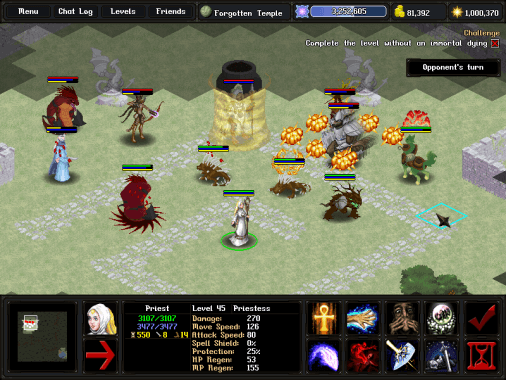
Where on earth did this Cat-ronaut come from?
Haha – the infamous Catronaut and Dr. Pup!! When shooting our Kickstarter video, we originally started it with 2 solid minutes of in-game footage. But my wife pointed out that viewers might never know that our video is hilarious (we like to think so) because they may not get through the game footage. So I wanted to insert a bit of comedy at the start. Hence, Catronaut and her flying jet-engine-powered skateboard were born.
You’ve worked on some big name projects like Bioshock 2. How was the experience going from working with a large developer to a studio comprised of just you and some collaborators?
There are differences and similarities. It’s the same in the sense that you go through all the same phases of development, and many of the game systems you’re developing are really no more or less complicated in a big name project like Bioshock as compared to a small one. Coding a plasmid in Bioshock or a spell in Immortal Empire is actually remarkably similar.
One notable difference is the capacity to find talented collaborators. It was very difficult finding artists for Immortal Empire. Even trying to pay people to do artwork was hard, which I did not anticipate. I would post on game development forums offering a paid contract for artists, and I would have those posts deleted by board admins because they thought we were running a scam. Obviously, we weren’t, and suffice to say, those misunderstandings don’t happen if you’re making Bioshock, hahaha. It took about 1 solid year (!!) before I found some artists that were consistent enough workers to make the artwork in Immortal Empire. (David Baumgart, Mat Chambers, and Zenobia Homan most notably, there were some others) I had to do a lot of the art myself too, sadly, and my pixel art skills are not exactly fantastic.
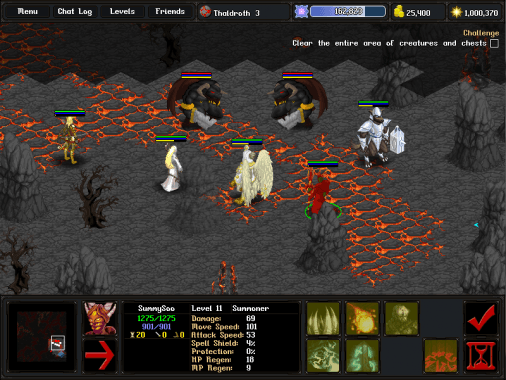
Overall though, the biggest difference is unquestionably visibility. Only a few awesome websites (like Capsule Computers!) give us press coverage, for which we are eternally grateful. Many pretty hardcore gamers have never heard of Immortal Empire, and I can’t help but think there is a fairly large contingent of players who would enjoy the game if it even showed up on their radar. With a franchise like Bioshock, you have a tremendous amount of leverage to secure press coverage, not to mention plenty of money to run advertising campaigns – and Bioshock is actually considered a niche title compared to blockbusters like Call of Duty or Halo.
Any plans to return to working for big companies after Immortal Empire?
In the short term, no. We have made some enormous improvements to our game engine, including full 3D support, and are currently working on a 3d first person puzzle game. We still like to come back to Immortal and release new content though – something we have been doing for 4 years now.
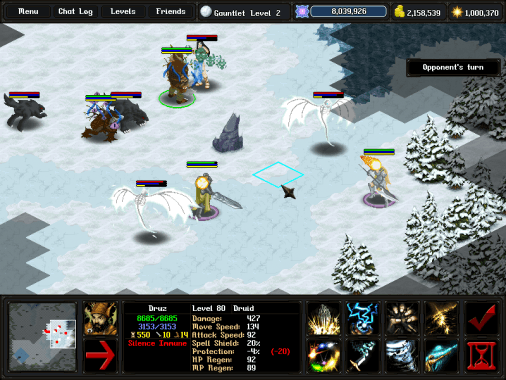
With all your experience, you must have advice for aspiring video game developers. Any you’d like to share?
Hmm. So many gems of wisdom, which one to choose? Haha – I guess the main one would be this. Game development at a high level is pretty difficult. It can be stressful and downright unpleasant. In some ways, it will not live up to any expectations you might have. Leigh Alexander’s post about ethics in video game development is generally accurate in my experience (though I can’t comment on the arms manufacturing stuff). This list is far from complete (which she admits) and I will call out one utterly enormous thing she has omitted – that the abuse, bullying, harassment, and sometimes direct physical assault is absolutely not just limited to women. I have witnessed (and experienced) pretty astonishing levels of abuse levelled against men, including sexual harassment. These are illegal things that just would most likely end up in a (victorious) lawsuit outside of the games industry.
All that being said, when you’re actually deep in the midst of designing and developing a good quality video game, it is still the most satisfying, best job I could possibly imagine.
Thanks to Jesse Attard for participating in the interview. Check out Immortal Empire on browsers and back the project on Kickstarter.

